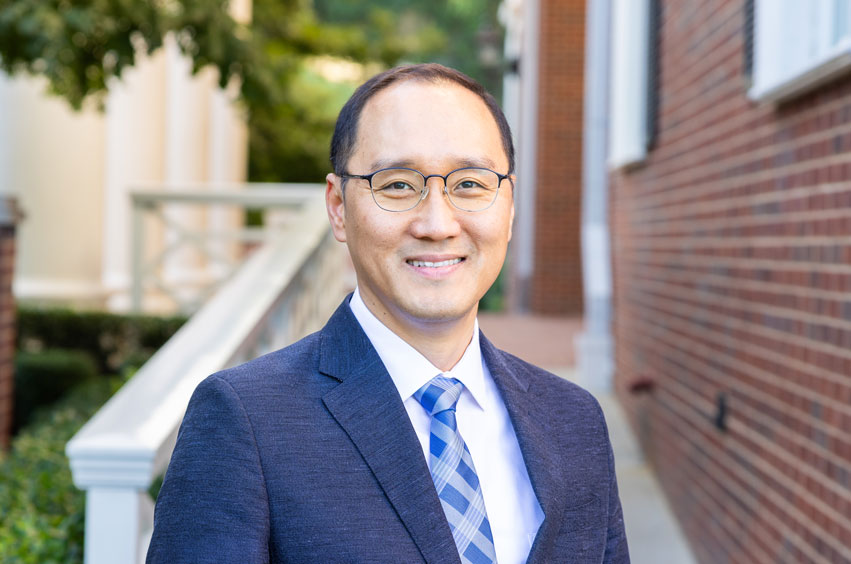Seeing the Lord Through Creation: Associate Professor of Biology Dr. Dongjae Jun Joins the DBU Family

"As a Christian who is also a scientist, the more I study, the more I am in awe of the Lord. The complexity, logic, and beauty inherent in nature continually astonish me."
Dr. Dongjae Jun was born in Seoul, South Korea. Dr. Jun's parents were originally from small towns outside Seoul and moved after they married. The Korean War significantly impacted his parents' lifestyle, so they did not have as many opportunities to pursue higher education. Dr. Jun's father started a business selling window frames and glass and led a flourishing life for himself and his family.
Life science has fascinated Dr. Jun for as long as he can remember. As a child, he was captivated by phenomena like how cows can digest grass due to the bacteria in their rumen that produce cellulase, an enzyme humans lack, or how albino rabbits' eyes appear red because of the absence of pigment, which reveals the blood vessels in their eyes. Dr. Jun shared, "These small wonders might not be so interesting to everyone, but they sparked my interest in biology."
Dr. Jun read the Bible for the first time as a junior in college. "What initially drew me in was how candidly the Bible spoke about human nature," he shared. Dr. Jun notes the words of Jesus found in Mark 7:21-23 as incredibly relatable. "I found this direct description of the human condition incredibly relatable as it mirrored my own heart." Jesus diagnosed the world as corrupted, and Dr. Jun realized that he, too, takes part in its corruption. After reading further, Dr. Jun discovered the unconditional love the Lord has for His people. Despite a defiled heart and constant betrayal, the Lord never gives up on His sons or daughters. "I came to Christ as I was," he explained. "There are no necessary prerequisites. His generous invitation into His love, rather than theology or apologetics, opened my heart and began my Christian walk."
In 1994, Dr. Jun enrolled at Sungkyunkwan University, South Korea's oldest university, which was initially established as a royal Confucian academy in the 14th century. During his undergraduate pursuits, Dr. Jun studied various sectors of biology, such as cell biology, microbiology, genetic engineering, biochemistry, molecular biology, genetics, human reproductive biology, ecology, animal physiology, immunology, and virology.
Dr. Jun also had the opportunity to be involved in several research projects, including one where they sought to purify a protein called vitellin, found in mosquito eggs. "It took months to collect enough eggs, and I even learned to differentiate between male and female mosquitos by sight," he explained. During his final years at Sungkyunkwan, he joined a field research team studying ocean ecology surrounding Jeju Island, South Korea's largest island. As a senior, Dr. Jun developed an interest in the circadian rhythm, the brain's internal clock that controls sleep-wake cycles, an emerging area of neuroscience at the time.
After graduating from Sungkunkwan with a B.S. in Life Science, Dr. Jun enrolled at the Pohang University of Science and Technology (POSTECH) to pursue an M.S. in Cellular and Molecular Biology. At POSTECH, Dr. Jun studied neuroscience, cell metabolism, and cellular signal transduction. During this season of life, Dr. Jun met his wife, Ran. They served at the same church and continued their education by pursuing doctoral degrees at POSTECH. Dr. Jun earned a Ph.D. in Cell Biology, Endocrinology, and Neuroscience, and Ran earned a Ph.D. in Immunology. They married in 2006 and moved to Dallas in 2009 to continue their post-doctoral studies at UT Southwestern Medical Center.
Dr. Jun spent 15 years at UT Southwestern working with the Department of Molecular Genetics, where he had the privilege of working in the same department as the first two Nobel laureates from Texas, studying cholesterol metabolism. His research focused on understanding how mutations in the UBIAD 1 gene, which synthesizes vitamin K2, lead to Schnyder Corneal Dystrophy (SCD). This genetic disease causes cholesterol to accumulate in the cornea. Dr. Jun was proud to share that a potential therapeutic molecule he discovered recently became approved for a patent. "Working alongside renowned scientists, including Nobel laureates and National Academy of Science members, was a great honor."
The Lord led Dr. Jun to DBU to serve as an Associate Professor of Biology in the College of Natural Sciences in Mathematics. He teaches Modern Concepts in Biology for science and non-science majors and Anatomy & Physiology Labs. "In the future, I hope to develop new curricula that integrate my areas of expertise," he shared. "Discoveries in science often shape our worldviews and are linked with philosophy and theology. I look forward to creating content that engages with these interdisciplinary connections."
Dr. Jun reflects on David's writing from Psalm 139:14, which says, "I praise you because I am fearfully and wonderfully made; your works are wonderful; I know that full well." David's reverence for God's creation, while lacking modern scientific knowledge, always amazes Dr. Jun. "There is no conflict between science and God's revelation," expressed Dr. Jun. "Our reason and intuition support the truth of the Bible. It is a privilege to share these thoughts and this worldview with the students and faculty at DBU."
Dr. Jun and his wife, Ran, attend New Song Korean Community Church in Carrollton with their three children: Arim, a senior in high school; Adan, a sophomore; and Aoun, a fifth-grader. Since 2019, Dr. Jun has served as a "Mokja" (Shepherd) for a group of families called a "Mokjang" (Ranch). They gather for worship, Bible study, and a meal every other week. He also leads a ministry called "Friends," which serves individuals with intellectual or developmental disabilities.
Cameron Billings is the Assistant Director of Media and Public Relations in University Communications at Dallas Baptist University.








